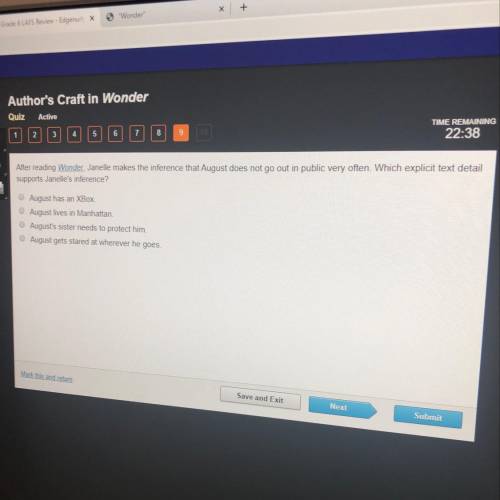
English, 16.03.2020 22:36 majorsam82
After reading Wonder Janelle makes the inference that August does not go out in public very often. Which explicit text detail
supports Janelle's inference?
August has an XBox
August lives in Manhattan
August's sister needs to protect him
August gets stared at wherever he goes


Answers: 3


Another question on English


English, 22.06.2019 04:20
Which statement best explains the relationship between the gothic genre and the characterization in the passage? o the characterization of mr. hyde contrasts with the gloomy setting that is typical of gothic fiction. o the characterization of mr. hyde reflects the preoccupation with confined spaces in gothic fiction the characterization of mr. hyde create the cheerful mood that is typical of gothic fiction. the characterization of mr. hyde reflects the focus on horror and strong emotions in gothic fiction.
Answers: 2

English, 22.06.2019 04:50
Read the passage, then answer the question that follows. no one could have seen it at the time, but the invention of beet sugar was not just a challenge to cane. it was a hint—just a glimpse, like a twist that comes about two thirds of the way through a movie—that the end of the age of sugar was in sight. for beet sugar showed that in order to create that perfect sweetness you did not need slaves, you did not need plantations, in fact you did not even need cane. beet sugar was a foreshadowing of what we have today: the age of science, in which sweetness is a product of chemistry, not whips. in 1854 only 11 percent of world sugar production came from beets. by 1899 the percentage had risen to about 65 percent. and beet sugar was just the first challenge to cane. by 1879 chemists discovered saccharine—a laboratory-created substance that is several hundred times sweeter than natural sugar. today the sweeteners used in the foods you eat may come from corn (high-fructose corn syrup), from fruit (fructose), or directly from the lab (for example, aspartame, invented in 1965, or sucralose—splenda—created in 1976). brazil is the land that imported more africans than any other to work on sugar plantations, and in brazil the soil is still perfect for sugar. cane grows in brazil today, but not always for sugar. instead, cane is often used to create ethanol, much as corn farmers in america now convert their harvest into fuel. –sugar changed the world, marc aronson and marina budhos how does this passage support the claim that sugar was tied to the struggle for freedom? it shows that the invention of beet sugar created competition for cane sugar. it shows that technology had a role in changing how we sweeten our foods. it shows that the beet sugar trade provided jobs for formerly enslaved workers. it shows that sweeteners did not need to be the product of sugar plantations and slavery.
Answers: 1

English, 22.06.2019 05:00
Which of the following best describes a situation where odysseus men succumb to temptation
Answers: 1
You know the right answer?
After reading Wonder Janelle makes the inference that August does not go out in public very often. W...
Questions







Geography, 28.06.2020 05:01





Mathematics, 28.06.2020 05:01



Computers and Technology, 28.06.2020 05:01







